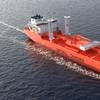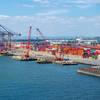Severe weather in Russia's Arctic already led to the build-up of more ice than normal for this time of year and is likely to cause major disruptions to shipping by October, a senior shipping official said.
"I have warned all possible clients that in October we will face big difficulties, especially in the second half of the month," Nikolai Babich, head of maritime operations at the Murmansk Shipping Company, said. "I've warned everyone that we may not be able to transport their cargoes as ordered. I might even have to turn down orders if nature doesn't allow it."
Murmansk Shipping Company operates Russia's fleet of nuclear icebreakers, which keeps the vital northern shipping route spanning the entire north coast of the country open to shipping throughout the year.
The route is vital for the smooth operations of Norilsk Nickel, the country's largest metals producer and a key global player in the platinum, palladium, nickel and copper markets.
Babich said he had already warned Norilsk of the risks.
He said freak weather conditions were already at work in the Arctic. "This year the ice situation in the Arctic is turning out to be very complicated. This is connected to the fact that 1999 has been a turning point in the cycle of solar activity. And this year has brought many anomalies such as floods, droughts, crop failure, disease, fires, and disasters," he said. "And the situation with ice is also an element connected with these cosmic influences. In the Arctic last winter, and now this summer, this can be observed, that is, there's too much ice, much more than usual."
He said practically all the main parts of the northern shipping route now have more ice than normal, and it is drifting, making shipping extremely hazardous.
"We've got three icebreakers working on the route, and so far these ships are enough to carry out all planned work. We haven't got any vessels blocked or frozen in, all work is going on as normal," he said.
However, Babich warned that although he had alerted users of the northern route of the risks, long-term forecasting was a hazardous business. "I fear to make a forecast for October and November because making a forecast more than a month ahead is very rarely worth it. To put it crudely, the forecast may turn out to be a dud."
Sponsored Content
Lower carbon intensity fuels to support your operations

Subscribe for
Maritime Reporter E-News
Maritime Reporter E-News is the maritime industry's largest circulation and most authoritative ENews Service, delivered to your Email five times per week










